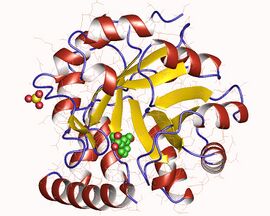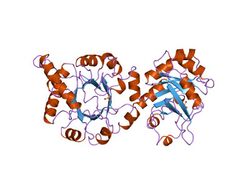Biology:Indole-3-glycerol-phosphate synthase
| indole-3-glycerol-phosphate synthase | |||||||||
|---|---|---|---|---|---|---|---|---|---|
 Indole-3-glycerol-phosphate synthase monomer, Mycobacterium tuberculosis | |||||||||
| Identifiers | |||||||||
| EC number | 4.1.1.48 | ||||||||
| CAS number | 9031-60-1 | ||||||||
| Databases | |||||||||
| IntEnz | IntEnz view | ||||||||
| BRENDA | BRENDA entry | ||||||||
| ExPASy | NiceZyme view | ||||||||
| KEGG | KEGG entry | ||||||||
| MetaCyc | metabolic pathway | ||||||||
| PRIAM | profile | ||||||||
| PDB structures | RCSB PDB PDBe PDBsum | ||||||||
| Gene Ontology | AmiGO / QuickGO | ||||||||
| |||||||||
| Indole-3-glycerol phosphate synthase | |||||||||
|---|---|---|---|---|---|---|---|---|---|
 three-dimensional structure of the bifunctional enzyme phosphoribosylanthranilate isomerase: indoleglycerolphosphate synthase from escherichia coli refined at 2.0 angstroms resolution | |||||||||
| Identifiers | |||||||||
| Symbol | IGPS | ||||||||
| Pfam | PF00218 | ||||||||
| Pfam clan | CL0036 | ||||||||
| InterPro | IPR013798 | ||||||||
| PROSITE | PDOC00536 | ||||||||
| SCOP2 | 1pii / SCOPe / SUPFAM | ||||||||
| |||||||||
The enzyme indole-3-glycerol-phosphate synthase (IGPS) (EC 4.1.1.48) catalyzes the chemical reaction
- 1-(2-carboxyphenylamino)-1-deoxy-D-ribulose 5-phosphate 1-C-(indol-3-yl)-glycerol 3-phosphate + CO2 + H2O
This enzyme belongs to the family of lyases, to be specific, the carboxy-lyases, which cleave carbon-carbon bonds. The systematic name of this enzyme class is 1-(2-carboxyphenylamino)-1-deoxy-D-ribulose-5-phosphate carboxy-lyase [cyclizing 1-C-(indol-3-yl)glycerol-3-phosphate-forming]. Other names in common use include indoleglycerol phosphate synthetase, indoleglycerol phosphate synthase, indole-3-glycerophosphate synthase, 1-(2-carboxyphenylamino)-1-deoxy-D-ribulose-5-phosphate, and carboxy-lyase (cyclizing). This enzyme participates in phenylalanine, tyrosine and tryptophan biosynthesis and two-component system - general. It employs one cofactor, pyruvate.
Structural studies
In some bacteria, IGPS is a single chain enzyme. In others, such as Escherichia coli, it is the N-terminal domain of a bifunctional enzyme that also catalyses N-(5'-phosphoribosyl)anthranilate isomerase (EC 5.3.1.24) (PRAI) activity, the third step of tryptophan biosynthesis. In fungi, IGPS is the central domain of a trifunctional enzyme that contains a PRAI C-terminal domain and a glutamine amidotransferase (EC 2.4.2.-) (GATase) N-terminal domain.
A structure of the IGPS domain of the bifunctional enzyme from the mesophilic bacterium E. coli (eIGPS) has been compared with the monomeric indole-3-glycerol phosphate synthase from the hyperthermophilic archaeon Sulfolobus solfataricus (sIGPS). Both are single-domain (beta/alpha)8 barrel proteins, with one (eIGPS) or two (sIGPS) additional helices inserted before the first beta strand.[1]
As of late 2007, 11 structures have been solved for this class of enzymes, with PDB accession codes 1A53, 1I4N, 1J5T, 1JCM, 1JUK, 1JUL, 1LBF, 1LBL, 1PII, 1VC4, and 2C3Z.
References
- ↑ Goldman A (December 1995). "How to make my blood boil". Structure 3 (12): 1277–9. doi:10.1016/s0969-2126(01)00263-5. PMID 8747452.
Further reading
- "Indole-3-glycerol phosphate synthetase of Escherichia coli, an enzyme of the tryptophan operon". J. Biol. Chem. 241 (20): 4616–24. 1966. PMID 5332729.
- Creighton TE; Yanofsky C (1970). "Chorismate to tryptophan (Escherichia coli) - Anthranilate synthetase, PR transferase, PRA isomerase, InGP synthetase, tryptophan synthetase". Methods Enzymol. 17A: 365–380. doi:10.1016/0076-6879(71)17215-1.
- "Proteomic survey of copper-binding proteins in Arabidopsis roots by immobilized metal affinity chromatography and mass spectrometry". Proteomics 6 (9): 2746–58. 2006. doi:10.1002/pmic.200500108. PMID 16526091.
 |

